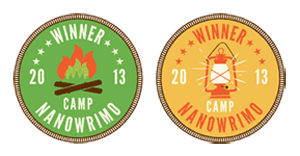You either start now, or it is not going to happen for you, and you are going to wake up at seventy years old…filled with sorrow that you let your dream, your passion, gift, fall by the wayside. You start now, as is. “As is” is the portal to creation, to new life. “As soon as” is a form of delusion and therefore soul death.
~ Anne Lamott
Write Now, As Is
Posted in Quotes
The Why of Writing

Let the reason you write—your why—become your motivation. Your why is the best boss you could ever ask for. It has only one requirement: You must show up, even if you don’t feel qualified yet. ~ Jerry Jenkins
Posted in Quotes
What Authors Wish They’d Known, Part 1
 Over the past few years I’ve conducted over a hundred interviews divided between KLWagoner.com and SouthWestWriters.com. I enjoy learning how authors deal with writers block and what kinds of scenes give them the most grief—and I can’t help compare my own creative process to theirs.
Over the past few years I’ve conducted over a hundred interviews divided between KLWagoner.com and SouthWestWriters.com. I enjoy learning how authors deal with writers block and what kinds of scenes give them the most grief—and I can’t help compare my own creative process to theirs.
In a previous post, I shared authors’ responses to, “What do beginning writers misunderstand about telling a story?”
Below are answers to another of my favorite questions:
Looking back to the beginning of your writing career, what do you know now that you wish you’d known then?
Michael Backus is a creative writing instructor and an author whose fiction and nonfiction have appeared in numerous print and online publications:
How lonely writing is, how much it separates a person from life and connection. When someone young asks me about being a writer, I usually play it straight and tell them practical pros and cons. But what I want to say is, “Run away, run away. Don’t do it.” I can distinctly remember sitting in a bar in the middle 90s with another writer friend in Chicago watching an all-girl punk band. During a break we both looked at each other and said, “Why the hell didn’t we start a band? Get better on the guitar, spend nights out with people rather than sitting at home rooting around in our own heads?” I still feel pretty much that way. I’ve heard it said a few times by writers that the only thing worse than writing is not writing, and…it is true. I continue to write because I want to continue to write.
Sarah Baker, the author of 20 novels and numerous novellas and short stories, writes mystery as S.H. Baker, romance as Sarah Storme, and erotica as Lydia Parks:
Everything I know now I wish I’d known then! I had no idea what I was doing when I started my first book. Still, I think I learn best by doing, so maybe I started at the right place for me. Because I had no illusions around my level of knowledge, I was open to learning from every editor with whom I had the opportunity to work.
Irene Blea, a native New Mexican with a Ph.D. in Sociology, weaves issues of social injustice into the women’s stories in her novels:
I wish I had known to write earlier in my life. I wish I had known to start young to write what I know as my truth with no concern about whether the work is commercial or not.
Sharon Vander Meer is a poet, a retired journalist, and an author of contemporary fiction and science fiction novels:
Never apologize for your art. Mistakes happen. Correct them when you can. Move on. Persist. Learn from criticism but don’t be hampered by it.
Jonathan Miller, a graduate of both the University of Colorado School of Law and the American Film Institute, draws on his unique experience to create the Rattlesnake Lawyer series:
To have my books professionally edited more than once before I submit them.
Zachry Wheeler is the author of two ongoing science fiction series—the humorous Max and the Multiverse books and the darker Immortal Wake series:
I wish I had known that writing is the easy part. Ninety percent of authorship has little to do with writing. It’s editing, publishing, networking, marketing, all that tedious stuff. It’s much like leveling up in gaming. Once you grind it out, then the game begins.
D. E. Williams is a software trainer who writes award-winning science fiction on her off-hours:
I would have encouraged my first and second readers to be more forthright a lot sooner. I wouldn’t have waited so long before deciding to self-publish. And I would have let go of the first book about three years earlier.
Patricia Smith Wood’s Harrie McKinsey Mysteries follows an amateur sleuth and her business partner as they solve crimes across the Land of Enchantment:
I wish I’d truly known, in my bones, that I didn’t have to have all the answers before I started. I came to realize that “starting” was really the beginning of “learning” how to do it. Without ever starting, you can’t possibly learn the steps along the way. It’s so true that the only way to improve is to simply sit yourself down and start—no matter how bad you may think it is. You can only get better by actually “doing” it!
Posted in Writing Advice
Writing Is: A Never-Ending Battle
That’s what writing is to me: a never-ending battle of brain-melting masochism. It’s a skill you never truly master, which is endlessly appealing…writing offers a bottomless pit of improvement. ~ Zachry Wheeler
Posted in Quotes
Author Interview: Lindsay A. Franklin
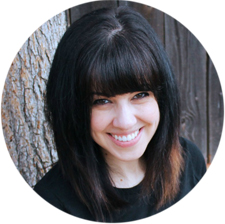 Lindsay A. Franklin is a freelance editor and the best-selling author of The Weaver Trilogy. The first book in the series, The Story Peddler (Enclave Publishing, 2018), introduces readers to a world where storytellers weave their wares into crystallized sculptures with the potential to reveal dark secrets. The Story Raider (2019) is the second release in the trilogy described as “a colorful fantasy of light, darkness, and the many adventures in between” and “a perfect blend of humor, heartache, and healing.” You’ll find Lindsay on her website LindsayAFranklin.com, as well as Facebook, Twitter, and Instagram.
Lindsay A. Franklin is a freelance editor and the best-selling author of The Weaver Trilogy. The first book in the series, The Story Peddler (Enclave Publishing, 2018), introduces readers to a world where storytellers weave their wares into crystallized sculptures with the potential to reveal dark secrets. The Story Raider (2019) is the second release in the trilogy described as “a colorful fantasy of light, darkness, and the many adventures in between” and “a perfect blend of humor, heartache, and healing.” You’ll find Lindsay on her website LindsayAFranklin.com, as well as Facebook, Twitter, and Instagram.
 What would you like readers to know about the story that unfolds in The Story Raider?
What would you like readers to know about the story that unfolds in The Story Raider?
I hope readers will see my heart in an even clearer, more obvious way than they did in The Story Peddler. Raider is a little darker, wrestles a little more deeply, and begins to touch on tragedy in a way I’m not sure Peddler was ready to fully explore. I love The Story Peddler for what it is, but something about The Story Raider feels like it reflects me as a human a bit more closely.
What unique challenges did this work pose for you?
I was under an insane time crunch to finish this book. This wasn’t my publisher’s fault. It’s just the way my work year panned out, and I wrote about 80,000 words in a month to finish on time. I’m a pretty fast writer, so this might not have been too terrible, except that The Story Raider takes my characters all around the empire on a ship. That meant I had to research ships, firstly, and I had to build four new cultures. In a month. Thankfully, I had the underpinnings of these countries, languages, and people groups churning in my mind for years beforehand, but even so, the mad dash to finish by my deadline was manic, to say the least.
You mention in previous interviews that the initial inspiration for the first book in The Weaver Trilogy came from a comment by an acquisitions editor who described herself as a story peddler. What inspired this second book?
Once I had the initial idea for Tanwen and her storytelling gift, the rest of the series logically snowballed—not all at once, of course, but one step at a time. As a writer, there are some goals you have as your series go on. Raise the stakes, expand the story world, deepen the character development, throw obstacles into budding relationships. For The Story Raider, I knew I wanted to see Tanwen mature a lot. I wanted to complicate her love life, have her wrestle with her family life, challenge everything she thought she knew about some people, and to begin to see the world beyond her tiny corner of familiarity. The plot for Raider grew up around some of these goals for Tanwen. I also had a strong idea about a new character’s journey in the third book, and Raider served as the introductory piece to this new character’s story.
Did you feel sorry for any of your characters as you tortured them on the page?
When I consider this question, the first character that comes to mind is Brac. I don’t want to spoil anything major, but I took one of my simplest characters and threw him into a very messy situation—much of which is his own fault, some of which is the result of manipulation. I feel terrible for him. I feel terrible for the mess I’ve gotten him into, and when I finished Raider, I wondered what in the world I was going to do with this poor boy. I left many of my characters in bad spots at the end of Raider, and he’s near the top of that list.
What was the most difficult aspect of world building for The Weaver Trilogy?
It’s always a challenge to take the world I imagine and try to convey it on the page without dumping information on the reader. Sometimes I get questions from readers about an aspect of world building (usually the magic system), and part of me wants to drop a Wikipedia entry about how the magic works in the middle of the story so everyone’s questions are thoroughly addressed. That would be bad writing, of course, so I won’t do that. But finding the balance between including enough information and doing so in a way that doesn’t bog down the story is really challenging, especially when you’re writing fantasy.
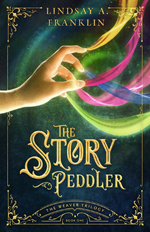 Describe one of the main settings and why you chose it for the story.
Describe one of the main settings and why you chose it for the story.
At the core of Tanwen’s character has always been that she’s a simple farm girl. She has big dreams, lots of talent, and the desire to see and do and be more. But the fact is, she was shaped by her upbringing in a small town. The ideologies of that small-town culture are at the center of who she is, even if she can’t see the value in that at the beginning of The Story Peddler (incidentally, this is one of my favorite things about Tanwen and Mor’s relationship in the first book—he’s the one who tells her to embrace who she is, small town and all, even as she chases her dreams). So I had a lot of fun taking my small-town girl and bringing her to exotic locations in The Story Raider. I love each of my new settings for different reasons, but I probably love the culture and history of Meridione the most. For Meridione, I drew upon my Italian heritage and several other cultures for my source material. One of the most fun scenes for me to write was when I took my Eastern Peninsula farm girl and plunked her down into a rough pub on the west coast of Tir. She orders tea.
What was your favorite part of putting this project together?
Coming back to these characters I love was so fun for me. I started my first draft of The Story Peddler in 2013, and while I had worked on it a lot in the years between the first draft and the release in 2018, The Story Raider was the first time I got to work with all-new material in ages. That was very refreshing, artistically.
Without giving the plot away, tell us a scene in The Story Raider that you’d love to see play out in a movie.
There are two battles in Raider that I would love to see play out in a movie—specifically the one that takes place aboard ship. I won’t say more than that, but it’s a very emotional sequence that I think would be visually stunning. Also, the introduction of a new-in-Raider character. We meet her on an island, and she’s a fascinating, tragic character for me. I would love to see her onscreen.
How awesome was it to win the 2019 Realm Award Book of the Year for The Story Peddler?
I was…beyond shocked. I still have no words!
As a freelance editor, what are some common mistakes or missteps you see in client submissions?
Too much telling—where the manuscript reads like a biography of the main character rather than a novel. Then there’s a stage where writers (myself included) learn about showing and telling and sometimes over-show. Where one quick line of narrative summary would suffice to keep the story moving, and instead we get a beat-by-beat description of a scene that doesn’t move the story along. Finding the balance between show and tell takes practice and sometimes a little coaching.
What writing projects are you working on now?
The third book in The Weaver Trilogy is complete and with my editor right now. The title is The Story Hunter, and it’s scheduled for release in May 2020.
Posted in Author Interviews
Reading and Writing Connection
What reading taught me was that I…had at least one story that needed to be told…that other people’s stories could speak to me in ways I never imagined…that the story I had to tell could speak to other people in ways I never dreamed. ~ Glynn Young
Posted in Quotes
Author Interview: Zachry Wheeler
 Zachry Wheeler is an award-winning author of two ongoing sci-fi series. His Max and the Multiverse books take a humorous look at a teenage gamer’s bizarre life shared with a band of quirky space jockeys. On the other side of the spectrum, the Immortal Wake series is a dark reimagining “of vampire lore through the lens of science fiction.” After Transient, book one of Immortal Wake, was published in 2016, Voltage Pictures optioned the novel and Zachry earned a screenwriting credit (along with Jim Burleson). Book two, Thursday Midnight (July 2019), is Zachry’s newest release. You’ll find the author on ZachryWheeler.com, as well as Facebook , Twitter, and Instagram. Visit his Amazon author page for all his current titles.
Zachry Wheeler is an award-winning author of two ongoing sci-fi series. His Max and the Multiverse books take a humorous look at a teenage gamer’s bizarre life shared with a band of quirky space jockeys. On the other side of the spectrum, the Immortal Wake series is a dark reimagining “of vampire lore through the lens of science fiction.” After Transient, book one of Immortal Wake, was published in 2016, Voltage Pictures optioned the novel and Zachry earned a screenwriting credit (along with Jim Burleson). Book two, Thursday Midnight (July 2019), is Zachry’s newest release. You’ll find the author on ZachryWheeler.com, as well as Facebook , Twitter, and Instagram. Visit his Amazon author page for all his current titles.
 What would you like readers to know about Thursday Midnight?
What would you like readers to know about Thursday Midnight?
Thursday Midnight is the sequel to my debut novel Transient. The story is more of a gritty thriller with pops of horror, which is a slight departure from the sci-fi noir feel of the first book. Transient was focused on world building and character motivations. Thursday Midnight throws a powder keg into the mix.
What unique challenges did this work pose for you?
The single most challenging aspect of this book was the third act. There were so many ways it could go wrong and thus be wildly misinterpreted. It was the writing equivalent of a tightrope walk, which is why I tripled my beta readers this time around. I needed to make sure I wasn’t being too cruel. They all loved it, thank goodness, despite the unsettling material.
Did “what-if” questions help shape this story?
Yes, but revealing that question would be a massive spoiler. The first book was straightforward, i.e., “What if vampires were real?” As in, scientifically plausible. The events of the second book take place within that established answer.
What is it about your main character, Jonas, that makes him strong enough to carry a series? Did your characters surprise you as the story unfolded?
Jonas’s strength in the series comes from his reluctance. He is not one to swallow orders or sprint into danger. He tends to question everything and sees the world through a wary lens. As such, he becomes a relatable character because his decisions lean towards virtuous without firmly rooting there. This hesitancy is a major plot-driver in the second book.
The characters definitely surprised me as Thursday Midnight unfolded, so much so that I ended up scrapping the first drafts and outlines because their motives didn’t make sense. In letting the characters tell the story that they wanted, the sequel ended up being much darker than originally intended.
When did you know you had taken the manuscript as far as it could go, that it was finished and ready for publishing?
I was on pins and needles when it came time for beta reading. I knew ahead of time there would be one of two reactions. One, their utter horror would necessitate a total rewrite. Or two, the shock would make sense within the story and result in a satisfying, albeit emotionally draining conclusion. Luckily, it was the latter. I breathed a sigh of relief, made all the necessary tweaks, and handed it off to my editor for a final polish.
What was your favorite part of putting together Thursday Midnight?
Handing it off to my editor. This book really took it out of me. I am immensely proud of it, and I see it as my best work to date, but it imparted a mental toll that I needed to recover from. For any readers who have finished the book, just imagine living and breathing this story for months on end.
 Of all the stories you’ve written, which one did you enjoy writing the most, and which was the most challenging?
Of all the stories you’ve written, which one did you enjoy writing the most, and which was the most challenging?
The most challenging was Thursday Midnight, for reasons I previously noted. The one I enjoyed writing the most was “The Item of Monumental Importance,” a Max and the Multiverse short story. At a high level, it’s a sci-fi riff on fantasy tropes, which was super fun to write.
You spoke at the 5th Annual Dublin Writers’ Conference in June 2019. What did you take away from that experience?
This was a fantastic event to be a part of, and I have already expressed interest in returning next year. As an attendee, I was able to expand my knowledge of screenwriting and marketing. As a speaker, it ended up being a networking bonanza. I think the highlight of the trip was tossing back pints with Dave Chesson of Kindlepreneur.com. We both have IT backgrounds, so it was quite the nerd-out session.
You continue to expand your Immortal Wake series as well as the Max and the Multiverse books (Max and the Multiverse, Max and the Snoodlecock, and Max and the Banjo Ferret). What are the challenges of writing a series?
It really depends on the nature of the series. For the Immortal Wake books, the biggest challenge is maintaining the timeline and world-building details. Readers will remember the smallest visual cues, so writing this series is an exercise in callbacks. I ended up re-reading Transient several times in order to create a detailed glossary of terms and traits. I needed to make sure I wasn’t tweaking anything accidentally. On the flip side, the biggest challenge behind the Max and the Multiverse series is maintaining a quality baseline of humor. World details are secondary to the laughs, so I spend more time on the jokes than the surroundings. However, the surroundings are sometimes the focus of the jokes, so it’s a balancing act at times.
Do you have any writing rituals or something you absolutely need in order to write?
I don’t have any quirks or rituals when it comes to my writing. The only thing I really need is silence. I find things like music and television to be distracting, so I will slap on a pair of noise-canceling headphones and get to work.
What are you most happy with, and what do you struggle with most, in your writing?
At this point, I think one of my biggest strengths is dialogue. I feel pretty happy with how most of it turns out, especially when it comes to comedy or tension. Early on, it took a lot of editing to remove my own voice from the characters. Nowadays, it flows much more naturally. My biggest struggle remains love scenes. I have tried to write them in the past, but they always end up disappointing. Not because they are bad, but rather because sexuality is so diverse. One person’s scandalous is another person’s “meh.” I’m not writing romance, so the love scenes are never the focus of the story. And so, I just write the foreplay and cut to the next scene, leaving the reader to imagine the tryst however they like.
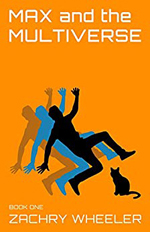 Is there something you’d like to develop from material you haven’t been able to use?
Is there something you’d like to develop from material you haven’t been able to use?
Funny enough, I figured out a way to utilize some of the most hilarious (but impractical) ideas I have for the Max and the Multiverse series. Max shifts between parallel universes whenever he falls asleep, and thinking up those crazy new worlds is some of the most fun I have as an author. However, any given shift needs to advance the main plot, so ideas will often get relegated to the “funny but can’t use” pile. I eventually realized that I could revive the best ones as one-off short stories. The first was recently published, entitled “The Item of Monumental Importance,” which is available on Kindle. These stories also serve as separate intros to the series, which is an added bonus. I am currently working on the second and third shorts.
Anything new on the movie production of Transient?
Nothing, unfortunately. The movie is still stuck in development (sigh), but check out the LookBook for basics such as Casting and Cinematics.
What writing projects are you working on now?
I have several WIPs at the moment. In no particular order: two short stories and a spinoff novel for Max and the Multiverse, and book three of Immortal Wake. At this point, it’s anyone’s guess as to which will be published next.
For more about Zachry and his writing, read part one and part two of his February 2017 interview, as well as an update from December 2017.
Posted in Author Interviews
The Beauty of Your Work
The thing is, if you work to minimize criticism, you have surrendered the beauty and greatness of what you’ve set out to build. ~ Seth Godin
Posted in Quotes
Author Interview: Meg Cowley
 Bestselling fantasy author Meg Cowley credits her writing path to her parents for encouraging her creativity, JK Rowling for inspiring her, and a meeting with Christopher Paolini that led her to finish the novel that started her first series. Her Books of Caledan (a trilogy plus prequel) take readers on a coming of age/sword and sorcery adventure full of dragons, elves, humans, and elementals. After fans clamored for more stories in that world, she developed a new set of characters and wrote the Chronicles of Pelenor. The new series currently includes books 1-3: Heart of Dragons, Court of Shadows, and Order of Valxiron. Connect with Meg on Facebook and her website at MegCowley.com, and visit her Amazon author page for all her books. To receive a free starter library, go to Fiction.MegCowley.com.
Bestselling fantasy author Meg Cowley credits her writing path to her parents for encouraging her creativity, JK Rowling for inspiring her, and a meeting with Christopher Paolini that led her to finish the novel that started her first series. Her Books of Caledan (a trilogy plus prequel) take readers on a coming of age/sword and sorcery adventure full of dragons, elves, humans, and elementals. After fans clamored for more stories in that world, she developed a new set of characters and wrote the Chronicles of Pelenor. The new series currently includes books 1-3: Heart of Dragons, Court of Shadows, and Order of Valxiron. Connect with Meg on Facebook and her website at MegCowley.com, and visit her Amazon author page for all her books. To receive a free starter library, go to Fiction.MegCowley.com.
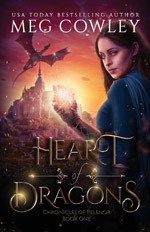 What is at the heart of your new series, the Chronicles of Pelenor?
What is at the heart of your new series, the Chronicles of Pelenor?
The Chronicles of Pelenor is an epic, sweeping saga that explores many of the issues we all face—identity, morality, and belonging—in a flawed world where what is right and good does not necessarily prevail.
All of the characters have incredibly complex back stories and motives, and these make it extra satisfying to write, watching them battle their inner demons. Some have lost love and struggle with grief, blame, and intimacy. Some have done unforgivable things and struggle to find redemption. Some are blinded by ideology, greed, or morality and don’t make the best of choices for themselves or others around them. Our choices bleed out into the world around us—as do theirs. One poor choice in this series ignites everything—what will become a world war, and the fall of everything, if it’s not averted.
I like to think that nothing is beyond redemption, and that anyone can find love, happiness, and belonging, but also that our actions have consequences that far outreach the sphere of our own life. I hope that this series explores those important themes and lessons in a worthy way.
Tell us about your main characters in the Chronicles. Why will readers connect with them?
There are several viewpoints in the series. The main ones are:
1) Harper—an orphan half-elf who has never really belonged anywhere. She’s struggling to define who she is in a new place, in the midst of chaos, who she can trust, what she wants, and how she can play a meaningful part in the struggle to come. Haven’t we all, particularly in our formative years, felt like this, wondering who we are and what life is about?
2) Aedon—an exiled elf running from the law with a hidden past of a spectacular fall from grace and a loss that he’s never healed from. He’s always running, never facing up to his problems. I think we’ve all got dark scars in our past that can negatively impact our future relationships and prospects if we let them.
3) Dimitri—an elven soul who wants to change the world. He’s always been an outcast, and he’s done dark things to get to a position of power, but deep down he knows he isn’t (and won’t be) accepted. I think it’s easy to condemn him, but equally easy to blind ourselves. To tend misguided views on what is important in life, and stick to them, no matter the consequences, out of sheer desperation.
In a strange way, Dimitri is who I identify with most. As a teenager—absolutely—Harper is me. Trying to figure out the world and my shaky place in it. But as an adult, having never really fit in and having made mistakes too in my life, I really identify with his journey of redemption and soul-seeking.
 Court of Shadows is book 2 of the Chronicles. What unique challenges did this work pose for you?
Court of Shadows is book 2 of the Chronicles. What unique challenges did this work pose for you?
I have clear visions for where the series needs to go—the character arcs and plot arcs. But actually, stories and characters are very fluid things and can go in unexpected (and wonderful or problematic!) directions. It’s a challenge to allow the story to flow organically, whilst also hitting those key markers.
When did you know you had taken Court of Shadows as far as it could go, that it was finished and ready for publishing?
I heavily plot my stories, so I always know when the end is done in terms of story. It goes through substantial edits, beta reads, advance reads, and proofreading. It’s a natural process now, and I know the story I have at the end of that process is worthy of reading.
So far, what has been your favorite part of putting together the Chronicles of Pelenor?
I adore the inter-character relationships and character growth—my favourite part of writing stories! I think my favourite part of the series, however, will be writing “The End” on book 4, the final installment, and being able to sit back and think “wow, it’s done.” Having a completed series is a magic like no other. All that hard work, all those words, done.
The Chronicles of Pelenor take place in the same world as the Books of Caledan. What sparked the initial story idea for the Caledan series? And what was the inspiration for the Chronicles?
My series all start with characters that appear in my head one day, and a world and story unfurls around them. Caledan began with Prince Soren and Eve. At the time, I was dealing with my own grief and coming of age, so their journey—Soren healing from his mother’s death and Eve finding herself—was a very natural thing to explore. When it comes to Pelenor, my readers have been begging for years for more stories from that world…Harper, Aedon, and about a dozen more appeared. Some have been sorted into series yet to come, but the main cast of this series just begged to be written. Again, their issues are ones I really want to explore as they strike home in my own journey and the concerns I have about our own world. I have so many more stories to tell in this world!
 What was the most difficult aspect of world building for these two series?
What was the most difficult aspect of world building for these two series?
There are many different species of beings with their own histories and cultures, so being mindful about differentiating and detailing these is difficult, especially when those aspects are not huge parts of this particular story arc.
Your writing takes many forms—short stories, novels, children’s books, and even adult coloring books. Is there one form you’re drawn to the most when you’re creating?
Epic fantasy! It’s my life blood. I just adore the complex narratives and multi-viewpoint tales. That being said, art always has a special place in my heart. I also run a fantasy book cover illustration business (EpicFantasyCovers.com), so I get my fix of fantasy art by drawing awesome fantasy covers for authors.
If the stars aligned, what past or present television or movie series would you love to write for (or be involved with in any capacity)?
Oh my gosh. Lord of the Rings, The Hobbit, Game of Thrones—or anything set in those worlds!
What first inspired you to become a writer?
I’ve always written and drawn, since I could hold a pencil. JK Rowling really inspired me—I grew up the same age as the characters when the Harry Potter books/films were being released, which was massively powerful in my formative years. It was meeting the very lovely Christopher Paolini in 2011, however, that sparked my decision to finally finish the book I had been writing since 2007… and the rest is history. That story eventually became (after much polishing and re-writes) the first in the Caledan series.
Do you have any writing rituals or something you absolutely need in order to write?
Oh, yes. Earl Grey tea. Silence. Somewhere comfy to sit. Time in the morning when my mind is fresh. And absolutely zero distractions, because I am a master procrastinator. I have to be super strict with myself! (Case in point: right now I am supposed to be writing Pelenor, book 3 but instead I am typing this…oops…sorry fans!)
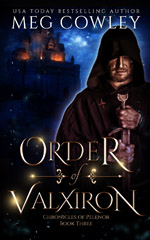 Do you have a message or a theme that recurs in your writing?
Do you have a message or a theme that recurs in your writing?
Identity and belonging. They’re things I’ve struggled with my whole life—and themes I think many of us grapple with at one point or another.
What writing projects are you working on now?
Order of Valxiron, Chronicles of Pelenor, book 3 (on pre-order through Amazon). Plus, I’m working towards rebooting and finishing my Morgana Chronicles series. I wish I could write faster to finish up all these stories!
Is there anything else you’d like readers to know?
Just that I really appreciate your support, everyone! It keeps me writing and publishing, one word after another, because I just don’t want to let you down. Thank you so much. I hope you enjoy our adventures together through stories.
Posted in Author Interviews










